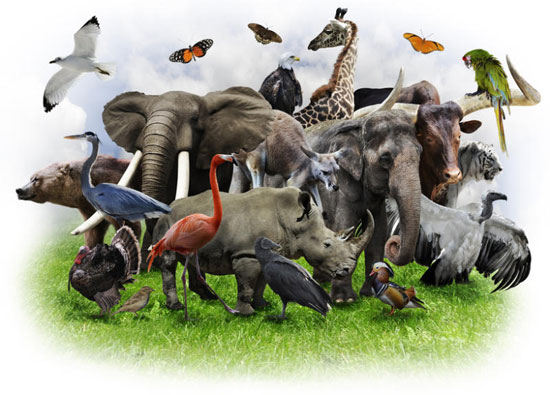Does synthetic biology protect wild life?
(hahoc.tv) - Can synthetic biology save the wild world? From regenerating extinct species to the risk of transgenic species.
What impact will the rapid development of synthetic biology have on natural conservation? Ecological and ethical challenges stemming from this question will require a new and continuing dialogue between members of the synthetic biology industry and biodiversity conservation agencies, according to the author. of a new article said.
According to the article, the field of synthetic biology - an industry that uses chemical synthesis DNA to create organisms to address human needs - is growing rapidly, with billions of dollars invested. annual. Many praises for the effects of synthetic biology such as: providing potential solutions to human health, food security and energy needs. But synthetic biologists also see in the tools of synthetic biology that can be used to combat climate change and water shortages.
Meanwhile critics warn that genetically modified organisms can pose a threat to native species and natural ecosystems. The authors of the paper assert that, in any scenario, a dialogue on the use and restriction of synthetic biological methods and products of synthetic biology must be initiated in favor of benefits of the whole society and decision makers.
The article is published in the online journal PLoS Biology. The authors of the paper include: Kent Redford of the Wildlife Conservation Society and advice Archipelago, Bill Adams of Cambridge University, and Georgina M. Mace of the University of London (UCL).

"Currently, synthetic biology and conservation agencies are quite alien to each other, although both have a lot of common interests and similar goals , " said Kent Redford, lead author of the article. advise. "An open discussion between the two communities is needed to help identify areas of cooperation on a topic that may change human relationships with the natural world."
The authors of the paper, together with scientists and other conservationists, will discuss the potential effects of synthetic biology that may have on the natural world and preserve in the Biology Conference. Synthesis and Conservation, scheduled to take place at Clare School in Cambridge, England, from April 9-11.
John Robinson, director of the WCS conservation agency, said: "Synthetic biology and a field are very important and a growing field, but its consequences impact on biodiversity and conservation. We have not been thoroughly researched yet. By dialogue between synthetic and conservation biology, we hope to gain an understanding of the opportunities of synthetic biology - and potential impacts - to protect. Better survival ".
Co-author Bill Adams from Cambridge University, said: "Our strategy to preserve ecosystems, species and genetic diversity, built in the last century, is challenged by biology. The close relationship of this emerging field needs to be included in conservation theories and actions for effective biodiversity protection efforts. "
The authors explain the need for new strategies in the conservation community to cope with the challenges of synthetic biology. They emphasize the five issues that arise that require policy discussion and decision by conservation scientists and those active in this area. Issues include:
- The ability to reproduce extinct species.
- How will synthetic organisms interact with existing species?
- What is our current definition of what is called "nature" .
- Use synthetic biology to produce natural services for humans (eg carbon absorption, pollution control).
- The use of synthetic life for its own benefits, as in applications for industrial, agricultural and aquaculture processes. The balance must pay between risks and achievements compared to public benefits and safety.
Georgina M. Mace of the Center for Biodiversity and Environmental Studies, UCL, co-author of the paper, said: "Discussions between conservation and synthetic biology are a necessity. We need take a closer look at issues and decisions that can change the whole life on earth. "
- Does synthetic biology change the future of food?
- Beam of photos: Lion life
- Synthetic biology: Robbery of creation
- Why did Australia destroy 2 million cats?
- Crustaceans start eating synthetic resin
- Creates creatures that help people settle on Mars
- The mystery of life in the wildest part of the earth
- Australia will drop poisoned sausages to kill millions of wild cats
- Wild tours are causing serious consequences
- Students protect wild animals
- Rhinoceros risking their lives with elephants to protect them
- First synthetic tree
 Why do potatoes have eyes?
Why do potatoes have eyes? 'Tragedy' the world's largest carnivorous life: Death becomes ... public toilet
'Tragedy' the world's largest carnivorous life: Death becomes ... public toilet Tomatoes were once considered 'poisonous' for 200 years
Tomatoes were once considered 'poisonous' for 200 years Detecting microscopic parasites on human face
Detecting microscopic parasites on human face